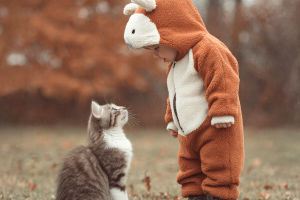A friend once told me about the day she brought home a scrappy shelter dog named Milo.
She thought she was rescuing him. But weeks later, when grief struck her family, Milo became her steady shadow, curling up beside her when she couldn't get out of bed.
That's the quiet magic of rescue animals—they often end up rescuing us right back.
The Power of Second Chances
Every rescue animal carries a story. Some were abandoned, others neglected, and many simply unwanted. But when they find a new home, something remarkable happens: healing starts on both sides.
Trust rebuilt – A dog who once cowered at every loud noise slowly learns that gentle hands mean safety. That transformation teaches us patience in a way no textbook could.
Unconditional love – Many adopters say their rescue pets seem extra grateful, following them from room to room, as if they know they've been given another chance.
Purpose renewed – For people who feel lost or lonely, caring for a rescue animal provides daily structure—feeding, walking, nurturing—and a sense of being needed.
These second chances don't just give animals new lives; they reshape human hearts.
Stories That Stay With You
The impact of rescue animals is often best told through personal stories.
The child and the cat – A shy little girl, struggling with social anxiety, bonded with a timid rescue cat. As the cat grew bolder, so did she. Teachers noticed her raising her hand more in class, her voice steadier than before.
The widow and the parrot – After losing her spouse, an elderly woman felt her home fall silent. That silence broke when a rescue parrot filled her kitchen with cheerful chatter every morning. It didn't replace her loss, but it softened the loneliness.
Each story is different, yet they all share the same theme: rescue goes both ways.
Why Rescue Animals Change Us
There's something unique about adopting an animal that's been through hardship. Unlike a pet from a breeder, a rescue often comes with scars—sometimes visible, sometimes invisible. Caring for them requires patience and empathy.
Slowing down – You can't rush a frightened cat to trust you. You learn to let progress happen on their terms, and in the process, you practice patience in every part of life.
Celebrating small wins – The first time a rescue dog wags its tail, or a once-silent bird sings, it feels like a triumph. Those moments teach gratitude for progress, no matter how small.
Growing resilience – Watching an animal bounce back from neglect or fear reminds us that healing is possible, even after setbacks. Their resilience becomes our inspiration.
These changes ripple outward, shaping how we approach relationships, challenges, and even ourselves.
The Ripple Effect of Adoption
When someone adopts, the impact goes beyond one household.
Shelters relieved – Every adoption opens space for another animal waiting in need.
Communities inspired – Friends, neighbors, and even strangers often feel encouraged to consider adoption after hearing success stories.
A culture of compassion – Choosing to rescue rather than purchase builds a society that values empathy over convenience.
The choice to adopt sends a message: every life matters, no matter how broken or overlooked it once was.
Simple Ways to Support Rescue Efforts
Not everyone can adopt, but there are many ways to help animals waiting for homes.
Foster temporarily – Even short-term fostering helps shelters manage overcrowding.
Volunteer time – Walking dogs, socializing cats, or helping with adoption events makes a difference.
Donate supplies – Food, blankets, and toys may seem small, but they provide comfort to animals in transition.
These acts of kindness ripple through the system, touching countless lives.
Rescue as a Two-Way Street
Milo, the scrappy dog who comforted my grieving friend, wasn't special in the sense of pedigree or training. What made him extraordinary was the bond he built with someone who needed him just as much as he needed her.
That's the heart of rescue: it's never one-sided. The moment you open your door to a rescue animal, you invite healing, joy, and connection into your life. And often, without even realizing it, they give back more than you could ever imagine.


